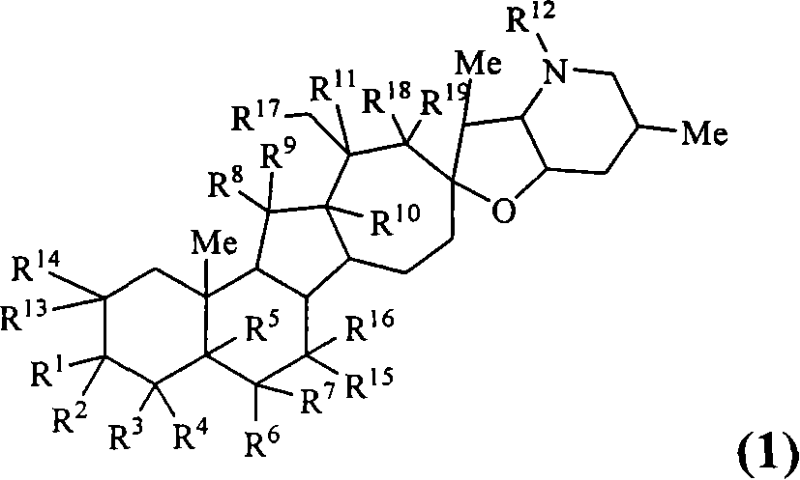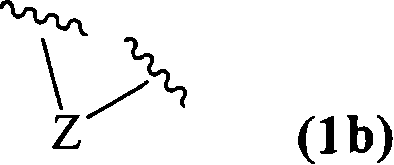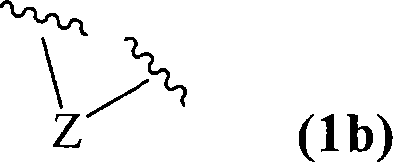Cyclopamine analogues and methods of use thereof
A kind of compound, technology of cycloalkyl, applied in cyclopamine analogue and its use field
- Summary
- Abstract
- Description
- Claims
- Application Information
AI Technical Summary
Problems solved by technology
Method used
Image
Examples
Embodiment 1
[0304] Preparation of derivatives of cyclopamine:
[0305]
[0306] Part A
[0307]
[0308] To a solution of cyclopamine 2 (250 mg, 0.6 mmol, 1 eq) in DCM (10 mL) was added Fmoc-OSu (205 mg, 0.6 mmol, 1 eq) at room temperature, and the resulting mixture was stirred at room temperature overnight. The resulting crude Fmoc-cyclopamine solution was cooled to 0 °C, treated with 15% diethylzinc in toluene (0.5 mL, 0.6 mmol, 1 eq) and stirred for 30 min (flask A).
[0309] Diiodomethane (0.4 mL, 6 mmol, 10 eq) in DCM (20 mL) was treated with 15% diethylzinc in toluene (3 mL, 3 mmol, 5 eq) at 0 °C and the resulting solution was stirred for 5 min (flask B).
[0310] The contents of flask B were transferred to flask A via cannula, and the resulting suspension was stirred at room temperature for 5 hours. The reaction was quenched with HCl (1M), stirred for 10 min (until all white solid redissolved), extracted with DCM (5x). dry (MgSO 4 ) organic extract, fi...
Embodiment 2
[0315] Therapeutic cyclopamine derivatives:
[0316]
[0317] Part A
[0318]
[0319] To a solution of hydrocinnamic acid 5 (3.01 g, 20 mmol, 1 eq) in anhydrous chloroform (30 mL) was added thionyl chloride (1.75 mL, 24.1 mmol, 1.2 eq) dropwise at 75 °C during 3 minutes. The mixture was refluxed for 3.5 hours. The solvent was distilled off to obtain the crude acid chloride as a pale yellow viscous liquid. The crude product was used without further purification.
[0320] Part B
[0321]
[0322] To a biphasic mixture of 7 (3.16 g, 24.1 mmol, 1.2 eq) in DCM (30 mL) and aqueous NaOH (2.0 M, 30 mL, 3 eq) was added the acid chloride 6 (3.38 g, 20 mmol, 1 eq) at 25 °C ) in DCM (10 mL), and the resulting mixture was stirred at 25°C for 3 hours. The mixture was then neutralized with aqueous HCl (2M, 30 mL). The organic layer was separated and the aqueous layer was extracted with DCM (3 x 50 mL). The combined organic layers were washed with HCl ...
Embodiment 3
[0333] Preparation of derivatives of cyclopamine:
[0334]
[0335] Part A
[0336]
[0337] Cyclopamine 2 (20 mg, 0.049 mmol, 1 equivalent) was suspended in dry toluene (0.6 mL) and cyclohexanone (150 μL, 1.47 mmol, 30 equivalents), then aluminum isopropoxide (79 mg, 0.392 mmol, 8 equivalent). The resulting mixture was heated to reflux for 2 hours, cooled to room temperature, diluted with ethyl acetate and quenched with Rochelle's salt solution. The biphasic mixture was stirred overnight, the layers were separated, the aqueous phase was extracted with ethyl acetate and washed with (MgSO 4 ), dried the combined organic extracts, filtered and concentrated in vacuo. The residue was purified by flash chromatography (DCM, DCM / methanol 98:2 and 95:5). The desired product was obtained as a white crystalline solid (70% yield).
[0338] Part B
[0339]
[0340] Diiodomethane (40 μL, 0.5 mmol, 25 equiv) in DCM (0.52 mL) was treated with 15% diethylzin...
PUM
 Login to View More
Login to View More Abstract
Description
Claims
Application Information
 Login to View More
Login to View More - R&D
- Intellectual Property
- Life Sciences
- Materials
- Tech Scout
- Unparalleled Data Quality
- Higher Quality Content
- 60% Fewer Hallucinations
Browse by: Latest US Patents, China's latest patents, Technical Efficacy Thesaurus, Application Domain, Technology Topic, Popular Technical Reports.
© 2025 PatSnap. All rights reserved.Legal|Privacy policy|Modern Slavery Act Transparency Statement|Sitemap|About US| Contact US: help@patsnap.com



